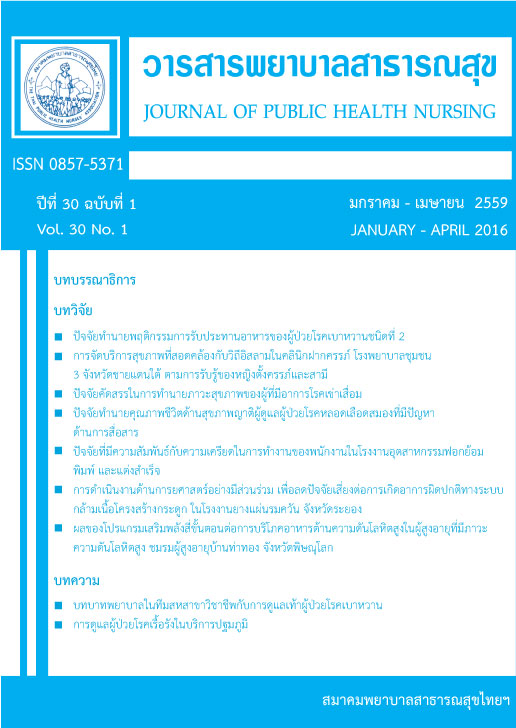ปัจจัยทำนายพฤติกรรมการรับประทานอาหารของผู้ป่วยโรคเบาหวานชนิดที่ 2* PREDICTIVE FACTORS OF DIETARY CONSUMPTION AMONG DIABETES MELLITUS TYPE 2 PATIENS
Keywords:
ผู้ป่วยเบาหวานชนิดที่ 2, พฤติกรรมการรับประทานอาหาร, แบบแผนความเชื่อด้านสุขภาพ, ความเชื่อมั่นในความสามารถของตนเองAbstract
ปัจจัยทำนายพฤติกรรมการรับประทานอาหารของผู้ป่วยโรคเบาหวานชนิดที่ 2
บทคัดย่อ
โรคเบาหวานเป็นการเจ็บป่วยเรื้อรังที่ไม่สามารถรักษาให้หายขาดและพบเป็นปัญหาที่สำคัญทั่วโลก พบว่าผู้ป่วยเบาหวานทั่วโลกมีจำนวนเพิ่มมากขึ้นอย่างต่อเนื่อง รัฐบาลจึงมีนโยบายให้มีการจัดตั้งคลินิกโรคเบาหวานขึ้น โดยมีการจัดกิจกรรมทั้งแบบรายบุคคลและรายกลุ่ม เพื่อปรับเปลี่ยนพฤติกรรมสุขภาพของผู้ป่วยเบาหวาน แต่ก็ยังพบจำนวนผู้ป่วยที่ควบคุมระดับน้ำตาลในเลือดไม่ได้มีจำนวนเพิ่มสูงขึ้น
การวิจัยครั้งนี้เป็นการวิจัยเชิงพรรณนา มีวัตถุประสงค์เพื่อศึกษาปัจจัยที่สามารถทำนายพฤติกรรมการรับประทานอาหารของผู้ป่วยเบาหวานชนิดที่ 2 โดยใช้แบบแผนความเชื่อด้านสุขภาพเป็นกรอบแนวคิดในการศึกษา เก็บรวบรวมข้อมูลระหว่างวันที่ 1 ธันวาคม 2556 ถึง 31 มกราคม 2557 โดยให้ผู้เข้าร่วมวิจัยเป็นผู้ตอบแบบสอบถามด้วยตนเอง กลุ่มตัวอย่าง ได้แก่ ผู้ป่วยเบาหวานที่มารับบริการที่แผนกผู้ป่วยนอก ที่มีอายุ 35-60 ปี จำนวน 210 คน (กลุ่มควบคุมระดับน้ำตาลในเลือดได้ 105 คนและกลุ่มควบคุมระดับน้ำตาลในเลือดไม่ได้ 105 คน) วิเคราะห์ข้อมูลโดยใช้สถิติเชิงพรรณนา ทดสอบความสัมพันธ์โดยใช้สถิติสหสัมพันธ์ของเพียร์สัน และวิเคราะห์ถดถอยพหุคูณเชิงส้นตรง โดยใช้โปรแกรมสำเร็จรูป SPSS
ผลการวิจัยพบว่า ปัจจัยที่สามารถทำนายพฤติกรรมการรับประทานอาหารของผู้ป่วยเบาหวานชนิดที่ 2 ที่ควบคุมระดับน้ำตาลในเลือดได้ ได้แก่ ความเชื่อมั่นในความสามารถของตนเองในการปฏิบัติพฤติกรรมเพื่อควบคุมระดับน้ำตาลในเลือด (p-value < .001) ในขณะที่กลุ่มควบคุมระดับน้ำตาลในเลือดไม่ได้ ได้แก่ การรับรู้โอกาสเสี่ยงต่อการเกิดภาวะแทรกซ้อนของโรคเบาหวาน (p-value < .001) และปัจจัยกระตุ้นการปฏิบัติพฤติกรรมเพื่อควบคุมระดับน้ำตาลในเลือด (p-value < .01) ดังนั้นการให้ความรู้ทางสุขภาพจัดกิจกรรมที่มุ่งเน้นในเรื่องการรับรู้โอกาสเสี่ยงต่อการเกิดภาวะแทรกซ้อนของโรคเบาหวานและปัจจัยกระตุ้นการปฏิบัติพฤติกรรมเพื่อควบคุมระดับน้ำตาลในเลือดในกลุ่มผู้ป่วยที่ไม่สามารถควบคุมระดับน้ำตาลในเลือดได้เป็นอันดับแรก และส่งเสริมความเชื่อมั่นในความสามารถของตนเองในการปฏิบัติพฤติกรรมเพื่อควบคุมระดับน้ำตาลในเลือดในกลุ่มผู้ป่วยที่สามารถควบคุมระดับน้ำตาลในเลือดได้
PREDICTIVE FACTORS OF DIETARY CONSUMPTION AMONG DIABETES MELLITUS TYPE 2 PATIENS
Diabetes mellitus is one of the serious chronic diseases and which as a major problem worldwide. The numbers of diabetes patients have increased steadily. Therefore, the government has launched the policy to establish the diabetes clinic and activities including health education and skill practice for enhancing people’s lifestyle modification. Individual or group counseling is also offering patients regarding how to deal with diabetes conditions. However, the number of uncontrolled diabetic patients was still high.
Using the health belief model as a conceptual framework. The purpose of this descriptive study was to determine the factors predicting dietary consumption among diabetes mellitus type 2 patients. The study was conducted from December 1st 2013 to January 31st 2014, The data were collected by self-administered questionnaires. Two hundred and ten diabetic patients (105 controlled and 105 uncontrolled) aged 35 – 60 years and were received care in outpatient clinic were randomly recruited. Statistical analysis was performed by using descriptive statistics, chi-square for a univariate analysis and stepwise logistic regression for multivariate analysis. All of which were done by the SPSS program.
Results showed that factors predicted dietary consumption in controlled group were self-efficacy in their ability of practicing behaviors to glycemic control (p-value < .001), whereas those in uncontrolled group were perceived susceptibility of diabetes complication (p-value < .001) and cues to action to practicing behaviors glycemic control (p-value < .01). Implication of the study includes effectively providing health education in a participatory manner focusing primarily on perceived susceptibility and cues to action in uncontrolled diabetic patients, and self-efficacy in order to increase effectiveness of prevention in controlled diabetic patients.
Downloads
Published
How to Cite
Issue
Section
License
บทความที่ตีพิมพ์และแผนภูมิรูปภาพถือเป็นลิขสิทธิ์ของวารสารพยาบาลสาธารณสุข (Thai Public Health Nurses Association)







